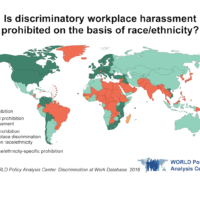Examining the Science Behind Decriminalizing Sex Work
Governments have cited protection of public health as a rationale for outlawing sex work, yet evidence shows that decriminalizing the trade increases health and safety and reduces the risk of disease, according to a new policy brief from researchers at UCLA. Released on International Sex Worker Rights Day, the brief reviews global data showing that the public health justification for criminalization and regulation of sex work is not supported by science. “There is scant evidence that criminalizing the sex trade has any positive effects on public health and the health of sex workers,” the brief states. Instead, it cites empirical studies linking criminalization to a rise in sexually transmitted infection and HIV transmission, as well as an increased risk of violence against sex workers. The authors draw a distinction between sex work, which is consensual, and sex trafficking, which is based on force, fraud or coercion or involves the participation of minors. The policy brief calls for further study on how laws and policies related to the sex trade can improve public health. While decriminalization may not fully eliminate the stigma and victimization of sex workers, the authors argue that “by removing criminal liability from the picture, approaches that seek to integrate sex workers into society can advance both human rights and labor rights of communities made vulnerable by multiple systems of oppression.” The policy brief was issued by researchers from UCLA’s Center for HIV Identification, Prevention and Treatment Services, Southern California HIV/AIDS Policy Research Center and Global Lab for Research in Action in partnership with the Sex Workers Outreach Project — Los Angeles.










Leave a Reply
Want to join the discussion?Feel free to contribute!